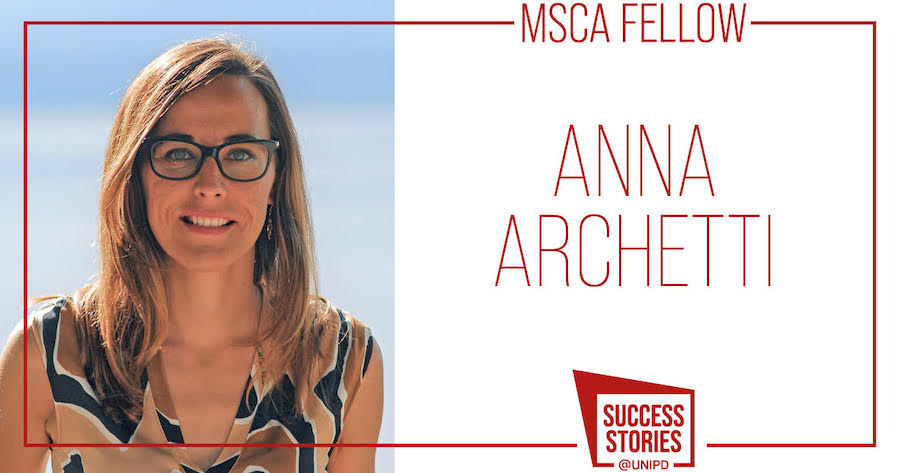
MSCA Fellow: Anna Archetti
From Physics to Biology and Neurosciences: a visionary research path

Anna Archetti completed her MA in Physics at the University of Trento, and, in 2019, she obtained her PhD in Photonics at the École Polytechnique Fédérale de Lausanne (EPFL).
In 2020, she started her project “FLAMMES” as MSCA fellow at the Department of Biomedical Sciences of the University of Padua, under the supervision of Prof. Dal Maschio. She applies photonics and biophysics techniques to neurosciences. She is realizing a novel on-chip microscope for zebrafish larva neuroimaging and her long-term goal is to be able to best screen the effectiveness of novel neurological drugs. Her aim is also to drastically improve the in vivo study of brain mechanisms.
Can you briefly and simply explain what your MSCA IF project is about?
The goal of this project is to develop a Fast, Large-Area Metasurface-based Microscope for Enhanced Screening (FLAMMES), that is a “miniaturized microscope” capable of producing whole-brain imaging and of tracking the behaviour of zebrafish larvae. Specifically, this small footprint platform, that is much smaller and lighter than current state-of-the-art instruments, should enable a dynamic volumetric map of the fluorescence signal of calcium-sensitive fluorescent reporters of the neuronal activity of the living organism. An in vivo strategy for monitoring brain dynamics through whole-brain imaging can map both the actual interaction mechanisms between a drug and a biological organism, as well as the drug impacts on its behaviour. It also opens to the possibility of automatically processing and evaluating, at the same time, thousands of compounds, such as neuro-specific drugs, for their biological activities. Such “miniaturized microscope” represents a key enabling technology integrating micro-nano fabrication techniques of metasurfaces with the state-of the-art CMOS monolithic imaging sensors.
Your MSCA-IF project is truly interdisciplinary. Do you think interdisciplinarity is an important aspect for a successful MSCA application?
Indeed, interdisciplinarity is a key aspect of my project and I believe it can play a crucial role in a successful MSCA application. In my case, a specific biological question (evaluation of biological activities of neurospecific compounds through concurrent monitoring of brain dynamics and behaviour of freely moving zebrafish) lies behind the development of a “miniaturized microscope”, and that allowed us to properly define the required technological breakthroughs. Of course, the proposed technology was essential in finding a way to tackle the biological question. I am totally convinced that there are ever more scientific fields in which interdisciplinarity and cross-disciplinarity are crucial for advancing the state-of-the-art.
You were granted a MSCA IF just after your PhD, which is a great result! How do you expect the MSCA IF will push your postdoc career forward?
I think this opportunity will help me in many ways. First, it will expand my skills and my fields of expertise. Moreover, the chance to work as principal investigator will boost my management and collaboration skills as, for instance, I am constantly challenged in organizational tasks, such as priority setting, risk assessment, supervision, and collaboration establishment.
You studied in different Universities in Italy and did your PhD at the École Polytechnique Fédérale de Lausanne (EPFL) in Switzerland, from which you returned for a secondment period during the MSCA IF project. What did you learn in such different environments? How do you manage to integrate the different knowledge and skills you have acquired?
Padua and Trento University allowed me to acquire the technical and mathematical competences necessary to effectively perform image processing and physical simulations, and to apply the scientific method that is needed for in-depth detector characterizations.
During my PhD in Photonics at EPFL, I then had the opportunity to further improve my know-how, and to apply it to concrete biological research. Working in the biological field as a physicist gave me the additional opportunity to learn the needs, the language, and the methodology used by the biologists I was teaming with. Currently, during this first year of Post Doc and secondment period in the Laboratory of Nanoscience and Energy Technologies (LNET) under the supervision of Prof. Tagliabue at EPFL, I am developing the necessary skills to be able to design, simulate, fabricate, and characterize tunable meta-lenses.
How did you meet your supervisor, Marco Dal Maschio? Did he support you in writing the project?
I was addressed to Prof. Dal Maschio group by Prof. Pavesi and Prof. Haase in Trento University, who both suggested his name to me. At that time, I was already looking to apply for a European grant, as I wanted to lead my own research, while profiting at the same time from the high-quality supervision and rich working environment opportunities only a big research institution could offer me.
Prof. Dal Maschio’s group has guaranteed me a world-leading level of expertise on the subject my project was targeting, and a resourceful laboratory ecosystem. Prof. Dal Maschio is a physicist by education, with a career profile that sits exactly at the interface between technological development and research in neuroscience. He immediately showed interest in my project, and managed to have me talking and discussing with all the lab members, as well as his collaborators at the Host Institution, confirming all the excellent opinions I previously acquired about the Host Institution and his team.
Prof. dal Maschio inspired, guided and supervised all the writing phases of the MSCA IF grant: this experience, an almost continuous brainstorming mixed with critical state-of-the-art review and precise project plan definition, turned out to be a fantastic experience and an integral part of the project itself.
What would you suggest to a researcher who is considering an application to a MSCA Postdoctoral Fellowship?
Trust your vision and those who support it. My dream was to use my competences in advanced platforms for fluorescence microscopy for neuro-specific applications, while further exploring the technical aspects of the photonics field. Although the field of neuroscience is huge and difficult to access with my PhD background, Prof. Dal Maschio was exceptionally supportive since the beginning, directing me step-by-step. Equally, Prof. Tagliabue gave me essential guidance and concrete support in the field of photonics, from theory to lab equipment. In other words, my suggestion would be to define your research direction and to look out for scientists that may be able to guide you. Once you choose your mentors, trust their advice and… keep trying!
International Research Office
via Martiri della libertà 8, 35137 Padova, Italy
tel. +39 049.827 1947 / 1948 / 1945
fax +39 049.827 1911
international.research@unipd.it


